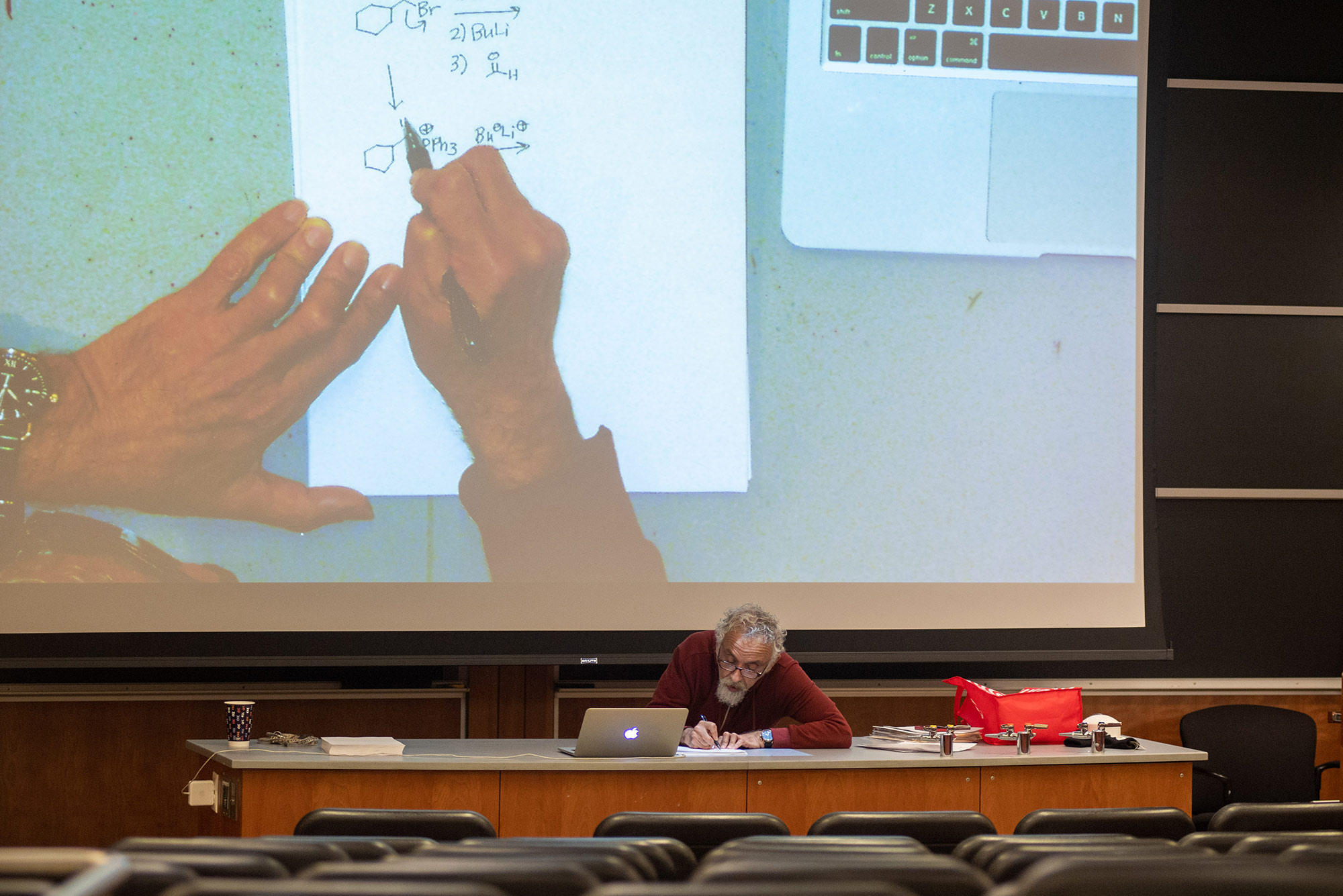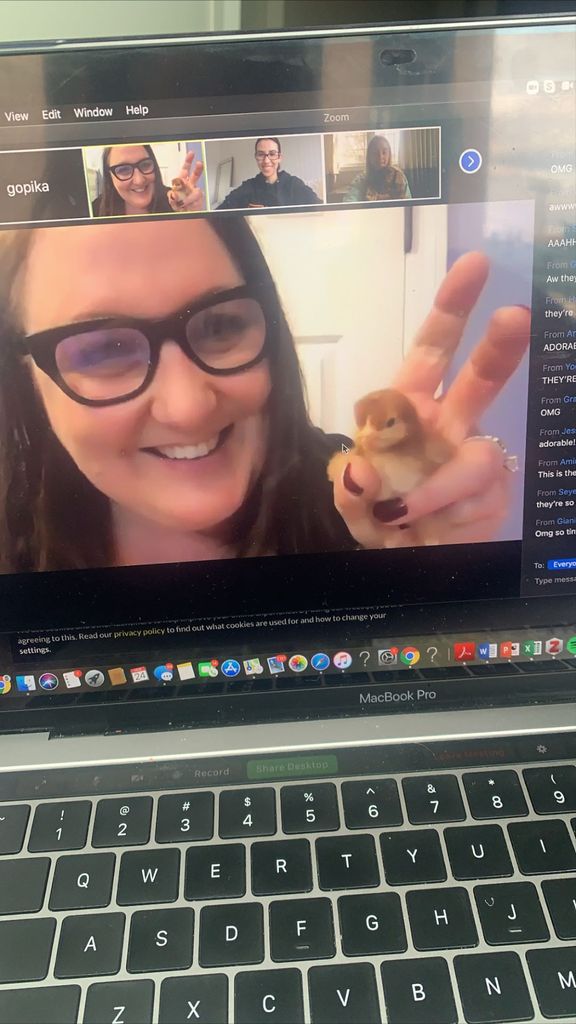How Did That Remote Learning Work for You?

Bruno Rubio (GRS’96), a CAS master lecturer in chemistry, holding remote office hours for students in March. Photo by Cydney Scott
How Did That Remote Learning Work for You?
In summer Zoom series, faculty to look back on lessons learned
With apologies to Rodgers and Hammerstein, here are a few of Sophie Godley’s favorite things from remote teaching:
“A more intimate environment than the classroom” (there’s nothing like meeting a student’s mom on Zoom or another’s pet iguana). “Sharing my new baby chicks with the class.” “Hearing from students who never in a million years would have raised their hands in our big [96-student] class, but were excited to chime in through the chat function on Zoom.”
Godley (SPH’17), a School of Public Health clinical assistant professor of community health sciences, can name her least favorite things, too. “Due to technical issues, time zones, anxiety, etc., we literally never saw a couple of students again. I’m still worried about them.” And she learned how much her students’ in-person presence had sustained her in the classroom before the COVID-19 pandemic forced BU to adopt remote teaching and learning in mid-March. “I missed the energy from the students terribly,” she says. “I literally had to lie on the floor after class, I was so exhausted.”
What went right with remote learning, and what could be done better? Godley, winner of a 2017 Metcalf Award, one of BU’s highest teaching honors, will join BU colleagues and students in a series of postmortems by—how else—Zoom.
These “Lightning Talks” for faculty, staff, and graduate students, each starting at 10 am and running one hour, begin tomorrow, May 29, and are scheduled into August. (Find the schedule and registration here.) Each talk will feature four or five speakers, each limited to five-minute presentations, followed by conversation among attendees.

The University plans to resume residential education on campus this fall under strict COVID-19 safety protocols, but leaders continue to monitor the pandemic situation. And remote teaching and learning will continue to play some part in the University’s life, as it has announced that more than 120 graduate and professional programs will be taught this fall with a hybrid/simultaneous approach.
“Although BU is making careful plans for the fall, so much remains unknown,” says Deborah Breen, director of the University’s Center for Teaching & Learning, cohost of the series. “We hope these forums and other training opportunities will help faculty to feel more prepared.
“We’re seeing these Lightning Talks as both a record and an incubator of ideas that will help faculty think through what worked and what didn’t in the spring semester, and then be able to adapt those ideas as they need to in the summer and fall,” Breen says.
“Beyond the technology,” she adds, “faculty demonstrated great compassion and care when working with students.…The Lightning Talks series is a chance for us to build community amongst BU’s faculty while hearing about the creative ways they met challenges in remote teaching.”
Also hosting Lightning Talks is Digital Learning & Innovation (DL&I), the University’s incubator for piloting novel ideas in digital education, which surveyed faculty in March about the transition to remote teaching and learning and followed up with a second review, Breen says. “When we compare the responses to these two surveys, we’ll be able to identify aspects of ongoing difficulty and areas of opportunities for successful experimentation,” and will publicize the results.
Maureen McCarthy, DL&I communications manager, says the semester demonstrated both resilience and mutual support on the part of faculty: “Medical Campus faculty on the front lines of the pandemic while engaging in remote teaching, the Zoom classroom serving as a music studio for viola duets, faculty and student broadcasters successfully launching live WTBU radio broadcasts, and more. Peer-to-peer support was also an unwavering force across both campuses this spring. Many BU instructors shared their remote teaching experiences and produced remote teaching guidance, video tutorials, and more.“
Thomas Underwood, a College of Arts & Sciences master lecturer in the Writing Program and a Lightning Talk presenter, helped BU colleagues learn Zoom, but he had to learn a few things himself, he says, when he saw the support “shell-shocked” students needed, “especially those in quarantine, those in difficult living circumstances, and those who endured taxing return travel to China and elsewhere.”
As a morale booster, he turned to a technique students might have remembered from their elementary school days: show and tell. At the start of each class, he had a student offer a brief personal display—introducing a pet (animals seem to be a remote learning motif), singing a song or playing an instrument, displaying hometown images, sharing a recipe, or relating an incident where the student saw someone “exhibiting courage or moral leadership,” Underwood says.
Another strategy involved opening an Instagram account, where he posted pep talks for his class. The video talks centered on inspiring people who had to face isolation themselves, from Nelson Mandela and Martin Luther King, Jr. (GRS’55, Hon.’59) to Travis Roy (COM’00, Hon.’16), paralyzed from the neck down in a freak accident during his first game as a BU hockey player in 1995.
“The greatest challenge on Zoom is to get students to see that the instructor and their classmates are genuinely present as sentient human beings—that remote learning does not mean remote minds, remote content, or a remote commitment by professors to their students,” Underwood says.
Comments & Discussion
Boston University moderates comments to facilitate an informed, substantive, civil conversation. Abusive, profane, self-promotional, misleading, incoherent or off-topic comments will be rejected. Moderators are staffed during regular business hours (EST) and can only accept comments written in English. Statistics or facts must include a citation or a link to the citation.